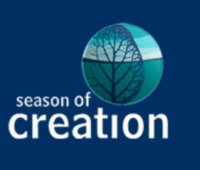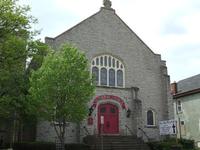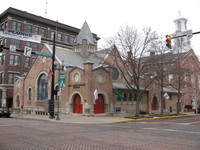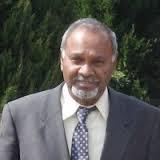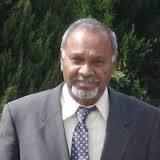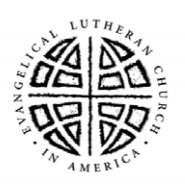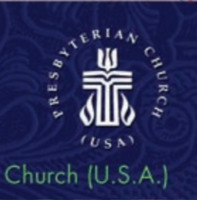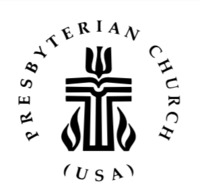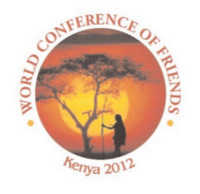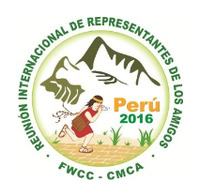Search
122 items
-
World Environment Day in Ruvu Mungano Tanzania
From Natalie Georgalas:
"On July 5, I spent the day at a World Environment Day celebration in a camp known as Loresho on the outskirts of the village of Ruvu Mungano in the district of Same in Tanzania. Loresho camp has been established by the Tanzanian government to help relocate people who have been affected by the flooding of the Ruvu River. The guest of honor for the ceremony was the Regional Commissioner who spoke of the relief the government was providing to the people and also how all the people of Same can make a difference on World Environment Day. The focus for the celebration was planting trees, which was done at the end of the ceremony to show a good example.
After the regional commissioner spoke, the regional bishop of the KKKT (in Swahili it is Kanisa la Kinjili la Kiluteri Tanzania) Northern Diocese Lutheran Church spoke about World Environment Day as well. Because the ceremony was given in Swahili, Mr. Gerry Mmbaga, who works for the Kilimanjaro Hope Organization (Kiho), did his best to translate it for me.
The Bishop spoke about the Bible, and how God created the world but he created the man last. As he created the first man, Adam, he ordered him to take care of each and every thing concerning the environment. He also discussed how conserving the world was ordered by God because the environment is life; without the environment there is no life. He emphasized that God created the world first and the man last and ordered the man in the Eden Garden to take care of the environment.
The translation from Swahili to English can sometimes be tough, but the main idea remains. If you would like to read more about Kiho, you can click here. If you are interested in learning more, I will be posting more about the religious organizations in Marwa, a village in the Same district, and how they engage with sustainable community development".
-
Season of Creation Calendar 2018-2020
The Uniting Church in Australia, Synod of Victoria and Tasmania has put forth a revised Season of Creation Calendar that is more inclusive of traditions and cultures from both domestic and international faith groups. In addition to the calendar dates, a calendar statement is included, calling for an ecological conversion along with a celebratory message of "Creation Day." -
Columbus Church Earns Green Spot and Energy Star Certification
The First English Lutheran church in Columbus created a Green Team to measure their energy use and carbon footprint. They took those numbers and applied to become a Columbus Green Spot and was soon after awarded the certification. Soon after, they replaced their gas furnace with a highly efficient one and became the first congregation in Ohio to earn the Energy Star Certification. To see the Energy Star certification page for the First English Lutheran Church, see the link below. -
Going Green: A Matter of Faith for Ohio Churches
This article written by Mary Kuhlman from Public News Service highlights the steps taken by the First Presbyterian Church in Athens, Ohio. They replaced their boiler system, and installed new lights and insulation. All of the renovations were done with the help of AEP Ohio, Columbia Gas, and Ohio Interfaith Power and Light
From the article, "First Presbyterian Church of Athens was recognized for its energy-efficiency efforts in the Environmental Protection Agency's 2013 Energy Star National Building Competition. Martin says they reduced energy use 20 percent for the past 12 months and in the process, prevented an estimated 9.2 metric tons of greenhouse gas emissions". -
Profile: Rev. Craig A. Foster, P.E.
Craig Foster, the Founder and President of Foster Energy Management, has over 33 years experience as an engineer and manager. His experience spans many areas of facility design, optimization and management including Energy Management Auditing and Implementation, Utility Management, Building Design and Operation, Water Treatment and Waste Water Treatment Plant Design and Operation, and Solar Thermal Installations. Craig has worked for a gas and electric utility, as an engineering consultant, and in facilities management and engineering for a major manufacturer. In addition, he has 15 years experience managing Environmental, Health, and Safety programs in an industrial setting. He graduated from the University of Iowa in 1977 with a Bachelor of Science in Mechanical Engineering and is a registered professional engineer in the State of Ohio.
Craig is also a Deacon in the Episcopal Church. Ordained in 2007, he serves St. John’s Episcopal Church in Columbus where he is involved in ministry to the homeless and marginally housed through Street Church and His Place. He has helped lead an effort of the BREAD organization in Columbus to reduce neighborhood blight through formation of a funded Community Land Re-utilization Corporation. Craig is also deeply committed to Kairos Prison Ministry and the issues surrounding those returning to society after being incarcerated. He dreams of having the Chapel at North Central Correctional Complex become a member of OhIPL.
Craig has spent 17 years committed to Kairos Prison Ministry and the issues surrounding those returning to society after being incarcerated. He helped found Franklinton Community Solar, a new non-profit dedicated to bringing solar energy to the Franklinton community in Columbus. The groups goals are solarize the community to provide environmental resiliency, to provide local jobs for those facing employment barriers, and to educate the neighborhood about the impacts of climate change in the inner city.
Craig is married to Kathy. They live in Columbus and together have five daughters, eight grandchildren and one dog. They enjoy being together, whether puttering in their yard, traveling, or just hanging out at home. -
Profile: Dr. Job Ebenezer
Dr. Job S. Ebenezer is the president of a nonprofit organization called Technology for the Poor. He is a retired professor of engineering. He started Technology for the Poor to design, innovate and disseminate simple technologies for less income people. He designed a dual purpose bicycle that can enable an ordinary bicycle to power small scale agricultural implements and other mechanical devices. He served as the director of the department of Hunger Education and Environmental Stewardship of the Evangelical Lutheran Church in America (ELCA). In 1993, he established a roof top garden at the ELCA building using wading pools. He established container gardens in several cites in the US as well as in Africa, Costa Rica, Belize, Ecuador and India. Recently, he is promoting vertical gardening appropriate to slum dwellers and apartment dwellers. He established container gardens at the Ascension Lutheran church, Faith Mission Men’s shelter, Columbus Academy for Humanities, Arts, Technology, and Science and in a soup kitchen in Franklinton. He lives in Westerville and has three children and five grandchildren. -
Speaker: Job Ebenezer
Job S. Ebenezer Ph.D, is the President of Technology for the Poor, which is a non-profit organization based in Columbus, Ohio. Their mission is to “develop, innovate and disseminate sustainable technologies to the poor all over the world”. He is a retired professor and previously taught engineering at Messiah College and the University of New Mexico. He created a course called ‘Global Sustainability – A Christian Perspective’ as well as taught the course himself at Messiah College in Pennsylvania. He earned his Ph.D in Mechanical Engineering.
He designed a dual purpose bicycle that can enable an ordinary bicycle to power small scale agricultural implements and other mechanical devices. He served as the director of the department of Hunger Education and Environmental Stewardship of the Evangelical Lutheran Church in America (ELCA). In 1993, he established a rooftop garden at the ELCA building using wading pools. He established container gardens in several cities in the US as well as in Africa, Costa Rica, Belize, Ecuador and India. Recently, he is promoting vertical gardening appropriate to slum dwellers and apartment dwellers. He established container gardens at the Ascension Lutheran church, Faith Mission Men’s shelter, Columbus Academy for Humanities, Arts, Technology, and Science and in a soup kitchen in Franklinton.
Through Technology for the Poor, he has travelled all across the world to conduct workshops on sustainable technologies for the poor in 4 African, 3 Central AMerican, 2 South American, and 2 Asian countries. He has spoken at numerous conferences, including Ohio Interfaith Power and Light, Master Gardeners Association of Ohio, Ohio State University Extension Services, and 4-H Club of Ohio. He has also given lectures at Ohio State University and Otterbein University.
His involvement in earth keeping activities is based on Genesis 2:15, “The Lord God took the man and put him in the garden of Eden to till it and keep it.”
Speaker Topics: global sustainability with a Christian perspective, technologies for the poor, urban agriculture, and environmental degradation and hunger. -
Earth Day statement from ELCA presiding bishop
The Reverend Elizabeth A. Eaton, Presiding Bishop of the Evangelical Lutheran Church in America (ELCA), issued an Earth Day statement on behalf of the ELCA. A salient excerpt from the statement is shown below:
"The effects of the warming climate are felt in nearly every corner of the globe. These include increased migration, food insecurity due to changing agricultural landscapes, national security issues and health problems. As bad as it is for all creation, the most vulnerable people around the world are suffering the most. Yet they have contributed the least and, as noted in the United Nation's 2030 Agenda for Sustainable Development,[iii] are ill equipped to adapt to or mitigate the effects of a changing climate to build resilient communities." -
Caring for Creation:Vision, Hope, and Justice
The Evangelical Lutheran Church in America has put forth this social statement, which emphasizes their stance on care for creation. The statement focuses on our place in creation, the current environmental crisis, and hope through action. In addition, they emphasize becoming an advocate for change. -
Presbyterians and Climate Change
This article posted on Yale Climate Connections discusses grassroots efforts of Presbyterian organizations, and notes specific time frames of salient Presbyterian accomplishments with regard to climate change. The following excerpt provides a general overview of their goals and mission:
"Presbyterians are engaged in many activities to combat climate change, from Earth Forums to hunger programs addressing food and climate crises and protests against practices that encourage reliance on coal. Since 2010, the Presbyterian Church has given 80 congregations an Earth Care Congregation Certification for demonstrating a strong commitment to environmental care." -
PC(USA) Collaborative Agenda on Environmental Stewardship
Chief executives of the six churches of the Presbyterian Church (U.S.A.) provide their rationale for creating the Collaborative Agenda on Environmental Stewardship:
"Noting the deep concern about urgent environmental challenges expressed by many commissioners at the 221st General Assembly (2014), chief executives of the six agencies of the Presbyterian Church (U.S.A.) appointed a working group to develop a joint response. The group consisting of at least one staff member per agency—was asked to craft a positive statement of what each agency, and the agencies together, have done and plan to do regarding environmental stewardship. This document is designed to call attention to ongoing efforts by the PC(USA) to confront the underlying causes of climate change, and to resources available through the six agencies to congregations, mid councils, and other mission and ministry groups wishing to join in the effort. The working group, meeting together regularly over a period of nine months, has produced the following document— 'Collaborative Agenda on Environmental Stewardship.' It has been reviewed by each of the agency boards, which have each endorsed the document as a whole and recommended that the General Assembly also endorse it as a helpful resource to the whole denomination. This effort is particularly noteworthy as it is unusual for an item of business to come to the assembly from a collaboration of all six agencies." -
Blessed Tomorrow - Caring for Creation Today - Commitment to Act on Climate Change
The Presbyterian Church acknowledges that burning fossil fuels can cause irreparable damage to the Earth and to humans, with a disproportionate impact on the poor and vulnerable, and advocate instead for cleaner energy sources. They emphasize that care for creation is not a political, economic, or scientific issue, but rather a moral responsibility laid before us by God. For this reason, they are partnering with Blessed Tomorrow, to facilitate the creation of new tools and guides that will help to create a more sustainable future. -
Solar
The Presbyterian Church has put forth the following webinar, providing some suggestions for both individuals and congregations to utilize cleaner sources of energy and reduce costs. The introduction is to the webinar is shown below:
"As the realities of climate change present an ever increasing urgency to our need to act faithfully in our energy consumption, many Presbyterians are exploring ways to support, purchase, and share renewable energy resources as an alternative to fossil fuel energy. From Presbyterian congregations drawing interest from the passers-by that notice solar panels on their rooftops, to a Presbyterian teen purchasing solar panels to charge his electric lawnmower (part of his carbon-neutral lawn-care service), the time is ripe to explore the options of solar energy as part of our Christian discipleship." -
Climate Change
The Presbyterian Church has put forth this video on care for creation, emphasizing that Christ has called us to go out into the world to care for creation and our fellow humans, especially the poor. The Union of Concerned Scientists has identified food, transportation, and energy as three key areas of focus to help stem climate change Congregations can help by implementing energy saving techniques, participate in recycling and composting waste, teaching children to grow food, and incorporating salient creation care concepts within educational settings. -
Water
The Presbyterian Church (U.S.A.) Presbyterian Mission website provides some helpful resources on critical water issues, with a special focus on the problems that result from fracking. Included are additional resources to learn more about fracking. With regard to community specific issues, they provide suggestions to encourage residents to investigate, educate, and act to take appropriate measures to alleviate the problems. -
The Power to Change
The 218th General Assembly of the Presbyterian Church U.S.A. (PCUSA) has put forth this resolution on energy and climate change as a resource for both individuals and entire congregations. Topics at the forefront of the report include: global warming, eco-justice norms, energy guidelines, non-renewable energy sources, and alternative and renewable energy sources. The final section includes resources for education, action and advocacy. -
Report and Recommendations on Limited Water Resources and Takings
The 216th General Assembly of the Presbyterian Church U.S.A. put forth this report on recommendations regarding critical water issues. The first half discusses water with regard to ethical considerations and sustainability. The second part provides an action/study guide that is designed for individual use as well as educational purposes. -
Globalization and the Environment
This study paper by Dr. Robert L. Stivers focuses on various types of attitudes and perspectives regarding human interaction with the environment. He maintains that environmental degradation has multiple causes, of which globalization might only be one factor. Dr. Stivers offers that globalization is a contributor to the extent that affluent individuals from around the world have yet to curb their spending habits and attitudes with regard its negative impact on nature. -
We Are What We Eat
The 214th General Assembly (2002) Presbyterian Church (U.S.A.) approved the following report titled We Are What We Eat. This report focuses on how people can influence the agriculture revolution with regard to sustainability, stewardship compassion, and community. The final section provides suggestions for activities and studies that congregations can engage in with regard to food production/consumption. -
Hazardous Waste, Race, and the Environment
This statement was approved by the 207th General Assembly Presbyterian Church (U.S.A.), 1995. The predominant theme focuses on the impact that hazardous waste has on individuals who are suffering from poverty and minority groups. The final section provides suggestions for taking action. -
Restoring Creation for Ecology and Justice
This report was adopted by the 202nd General Assembly (1990) Presbyterian Church (U.S.A.). Their Committee on Social Witness Policy urges the assembly to adopt specified policies within the document. The report covers of multitude of critical environmental issues, with sound policy recommendations and actions that congregations can take to support the myriad of sustainability issues. -
A Shared Quaker Statement: Facing the Challenge of Climate Change
This statement calls for leaders to make sound decisions with regard to climate change, and for all people to cherish the Earth for future generations. The following introductory section highlights the sense of urgency:
"As Quakers, we understand anthropogenic climate change (climate change due to human activities) to be a symptom of a greater challenge: how to live sustainable and justly on this Earth.
We recognize that the current rise of greenhouse gas emissions is leading to an unprecedented rate of increase in global average surface temperature of extreme detriment to the Earth’s ecosystems and species, including human beings.
We recognize that catastrophic global climate change is not inevitable if we choose to act urgently." -
A Quaker Response to the Crisis of Climate Change
A Quaker Response to the Crisis of Climate Change discusses how climate change and consumer waste negatively impacts disadvantage populations the most. The first two paragraphs of the introduction are stated below:
"The crisis of global climate change represents a supreme test of humanity’s collective wisdom and courage. Our immoderate use of the Earth’s resources violates the entire biosphere, threatening the lives of millions of people and the habitats of thousands of species. Many of the poorest people are already suffering a changed climate; they are
asking us all to act.
How has humanity produced this crisis? Our faith response is that prevailing social values have obscured what it means to live authentically on this Earth. In rich European countries we consume more than we need within an economic system that divides us as a society; in much that we do, we cause harm to the planet and each other without enriching our lives." -
The Kabarak Call for Peace and Ecojustice
The Kabarak Call for Peace and Ecojustice, at the World Conference of Friends in 2012, maintains that we live in times in which the Earth can not replenish itself, so we must intervene where we can. In addition, we need to look out for our fellow humans, especially those who are less fortunate than us. The following paragraph provides the introduction to the text:
"In past times God’s Creation restored itself. Now humanity dominates, our growing population consuming more resources than nature can replace. We must change, we must become careful stewards of all life. Earthcare unites traditional Quaker testimonies: peace, equality, simplicity, love, integrity, and justice. Jesus said, 'As you have done unto the least… you have done unto me'. We are called to work for the peaceable Kingdom of God on the whole earth, in right sharing with all peoples. However few our numbers, we are called to be the salt that flavours and preserves, to be a light in the darkness of greed and destruction."
-
FWCC Sustainability Minute
This minute was drafted at the FWCC World Plenary in Pisac, Peru in January 2016. These excerpts provide some salient points on sustainability/request by the Quakers who were involved with its creation:
"Invest FWCC World funds ethically. Share Quaker experiences with other faith groups to inspire them to action, especially through the World Council of Churches. Seek ways of connecting Friends worldwide that are sustainable. Facilitate dissemination of training materials on sustainability issues for Quaker leaders, pastors and teachers."
"Initiate at least two concrete actions on sustainability within the next 12 months. These may build on existing projects of individuals or monthly meetings or they may be new initiatives. We ask that they encourage Young Friends to play key roles. We ask that meetings minute the progress and results, so as to share them with FWCC and Quaker meetings. Support individuals and groups in their meetings who feel called to take action on sustainability. Support the work done by Quaker organisations such as the Quaker United Nations Office and the Quaker Council for European Affairs to ensure that international agreements and their implementation support sustainability."


